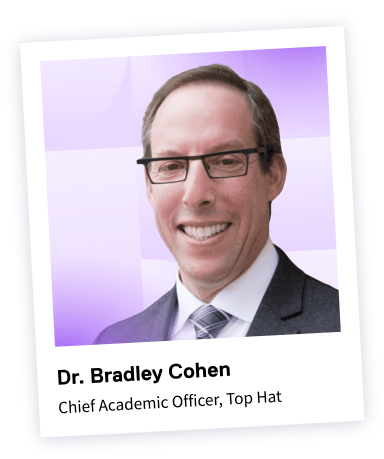Here's How to Design Your Course with Intention
Evidence-informed teaching. Improved student engagement. More inclusive learning. It's all part of The Top Hat Guide to Intentional Course Design created by Dr. Bradley Cohen, Chief Academic Officer at Top Hat.
- 1. Backward Design
- 2. Significant Learning
- 3. Cultivating Attention
- 4. Inclusive Teaching
- 5. Evidence-Informed Iteration

In my early days as an instructor, I felt pretty good about my teaching practice. But it took a push from a mentor to make me question whether what I was doing was, in fact, helping my students learn and develop.
The desire to improve my course design wasn't simply to see more students succeed on the final exam. I wanted to create meaningful learning experiences that would endure in their approach to understanding and living in the world.
This guide encompasses the many influences that have inspired me as an educator. My hope is to offer insights, tools, and inspiration to help you make an even bigger difference to your students.
Backwards Design
The superpower of backward design is that it encourages intentionality: Clearly defining the learning goals at the outset, the 'why' behind each assessment, and how learning activities will support the course objectives—making it easier to communicate the value of what you're asking students to do.




Think through the following questions:

What ideas would you like students to remember? How will students be able to apply the knowledge they gain beyond this course? What knowledge or skills will they acquire?

What tasks will be required of students to demonstrate they have achieved the desired outcomes? Thinking beyond summative assessments, what homework, quizzes, and assignments will students use to demonstrate their learning?

We have more tools to leverage to make learning engaging and effective beyond the traditional lecture. Consider the role of discussions and debates, problem solving exercises, peer instruction, or experiential learning. How might these contribute to achieving the objectives of the course?
Significant Learning
L. Dee Fink's seminal book Creating Significant Learning Experiences offers an important refinement on backward design. Significant learning emphasizes that, for enduring learning to occur, students need to make connections between what they are learning about and their own lives, interests, experiences, and aspirations.
Fink challenges us to think about the following questions as we design our course:

Integration
What connections do we want students to make between concepts and ideas within the course, other disciplines, or their own lives?

Human dimension
What would we like students to learn about themselves, their peers or those they may encounter in the future?

Caring
What changes would we like to see in students in terms of what they value and how they feel about what they've learned?

Metacognition
What should students walk away knowing about the process of their own learning?
Rome wasn't built in a day, and neither is transformational learning. Start by making a few changes. Learn, revise, and continue to iterate. Go in-depth on significant learning strategies.
Cultivating Attention
James Lang, author of Distracted: Why Students Can't Focus and What You Can Do About It, points to playwrights as masters of using structure to capture and hold our attention. There are acts and scenes. The action rises and falls. All of these elements are used to keep us focused.
Reflect on the time you spend with students. Are there moments when they are more attentive? Is there a pattern you can see within a lecture or across the semester? What lessons can you draw from this?
Tips on Cultivating Attention
Lang offers these suggestions to help us improve student attention more deliberately and effectively in our classrooms.

Be attentive to the community in the classroom, and encourage students to be more attentive to one another.

What helps them stay focused? What can be done differently? Formalize the output and provide frequent reminders.

If you're teaching a difficult concept, alternate with something that's going to give students a mental break. The key is to structure activities in ways that will keep students focused.
Inclusive Teaching
Intentional course design is the foundation for equitable and inclusive learning. That means thinking deliberately about how we foster belonging, and how we engage, interact with, and assess in ways that ensure all students are set up for success.




Structure Matters
As professors Viji Sathy and Kelly Hogan suggest, more structure works better for most students, since it won't harm those who don't actually need it! Here are some ways we can use structure to create a more inclusive learning environment.
Assessment-Rich Learning
One of the most important places we can effect change is with our assessment practices. Traditionally, this consists of high stakes midterms and final exams that offer little room for error. The good news is there are a variety of ways to use assessments to enrich the learning journey and give students the feedback they crave.
Assessing Early and Often
Regular low stakes testing creates opportunities for students to develop the growth mindset so important for success in higher education. Harvard researchers found that interspersing online lectures with regular testing helped students focus more effectively. They retained information longer and were also less anxious knowing that a poor showing on one test would not have a major impact on their final grade.
Making Assessments Equitable
The Center for Educational Innovation at the University of Minnesota offers a few simple things we can do to make learning more equitable.
Transparency
Clarity is important in ensuring students are confident about the purpose behind each assessment and how to prepare efficiently.
Evidence-Informed Iteration
Healthcare professionals are required to demonstrate a clear commitment to evidence-based practice. Bad outcomes are mined for insight and shared widely to drive improvement. While this level of rigor has yet to find its way into most classrooms, there are many opportunities to apply the spirit of investigation to continuously improve how we teach.
Making Use of 'Small Data'
The use of 'small data', gathered by establishing frequent touchpoints to assess learning is a powerful way to shape the learning experience. From quizzes, polls, and discussions, to attendance, participation and summative assessments, there are many ways to capture insights to make our courses more effective.
Educational technology platforms like Top Hat make it easy to automatically collect and analyze data, to do the following (and more).

Identify student needs
Using data to track performance makes it easier to identify areas where a class or individual students may need more practice.

Personalize learning
Using polls and class surveys to understand student backgrounds, prior knowledge, and areas of interest provide insights to tailor the learning experience.

Measure progress
Tracking engagement, participation and assessment data allows instructors to adjust their teaching practices to ensure students are making steady progress.

Provide feedback
Frequent low stakes assessments provide more opportunities to help students understand their strengths and weaknesses.

Improve collaboration
Data-driven insights make it easier for educators to identify best practices, develop new teaching strategies, and work together to improve student learning.

Download Guide Now
Get more tips on evidence-informed teaching. It's all in your free guide!
Bibliography
-
 Fink, L.D. (2003). What is Significant Learning?
https://www.wcu.edu/webfiles/pdfs/facultycenter_significantlearning.pdf
Fink, L.D. (2003). What is Significant Learning?
https://www.wcu.edu/webfiles/pdfs/facultycenter_significantlearning.pdf
-
 Hogan, K., & Sathy, V. (2023). Inclusive Teaching: Empowering All Students to Thrive [Webinar]. Top Hat.
https://tophat.com/teaching-resources/webinars-and-videos/higher-learnings-inclusive-teaching-viji-sathy-kelly-hogan/
Hogan, K., & Sathy, V. (2023). Inclusive Teaching: Empowering All Students to Thrive [Webinar]. Top Hat.
https://tophat.com/teaching-resources/webinars-and-videos/higher-learnings-inclusive-teaching-viji-sathy-kelly-hogan/
-
 Hommel, D. (2022). Aspiring to Create Learning Experiences Students Remember. Faculty Focus.
https://www.facultyfocus.com/articles/effective-classroom-management/aspiring-to-create-learning-experiences-students-remember/
Hommel, D. (2022). Aspiring to Create Learning Experiences Students Remember. Faculty Focus.
https://www.facultyfocus.com/articles/effective-classroom-management/aspiring-to-create-learning-experiences-students-remember/
-
 Lang, J. M. (2020). Distracted: Why Students Can't Focus and What You Can Do About It. Basic Books.
Lang, J. M. (2020). Distracted: Why Students Can't Focus and What You Can Do About It. Basic Books.
-
 Linden, K., Hicks, B., & Teakel, S. (2022). Weathering the Storm: Targeted and Timely Analytics to Support Disengaged Students. EDUCAUSE.
https://er.educause.edu/articles/2022/9/weathering-the-storm-targeted-and-timely-analytics-to-support-disengaged-students
Linden, K., Hicks, B., & Teakel, S. (2022). Weathering the Storm: Targeted and Timely Analytics to Support Disengaged Students. EDUCAUSE.
https://er.educause.edu/articles/2022/9/weathering-the-storm-targeted-and-timely-analytics-to-support-disengaged-students
-
 Piantaggini, L. (2020). Backward Design: Bad for Languages. Magister P.
https://magisterp.com/2020/06/14/backward-design-bad-for-languages/
Piantaggini, L. (2020). Backward Design: Bad for Languages. Magister P.
https://magisterp.com/2020/06/14/backward-design-bad-for-languages/
-
 Reuell, P. (2013). Online Learning: It's Different. The Harvard Gazette.
https://news.harvard.edu/gazette/story/2013/04/online-learning-its-different/
Reuell, P. (2013). Online Learning: It's Different. The Harvard Gazette.
https://news.harvard.edu/gazette/story/2013/04/online-learning-its-different/
-
 Rosales, J., & Walker, T. (2021). The Racist Beginnings of Standardized Testing. National Education Association.
https://www.nea.org/advocating-for-change/new-from-nea/racist-beginnings-standardized-testing
Rosales, J., & Walker, T. (2021). The Racist Beginnings of Standardized Testing. National Education Association.
https://www.nea.org/advocating-for-change/new-from-nea/racist-beginnings-standardized-testing
-
 University of Minnesota: Center for Educational Innovation (n.d.). Equitable Assessments.
https://cei.umn.edu/teaching-resources/assessments/equitable-assessments
University of Minnesota: Center for Educational Innovation (n.d.). Equitable Assessments.
https://cei.umn.edu/teaching-resources/assessments/equitable-assessments
-
 Wiggins, G. P., & McTighe, J. (2008). Understanding by Design. Association for Supervision and Curriculum Development.
Wiggins, G. P., & McTighe, J. (2008). Understanding by Design. Association for Supervision and Curriculum Development.